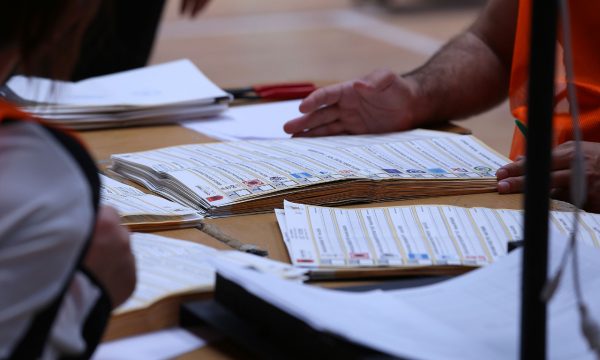Provocations by Democratic representatives spark tensions in multiple voting centers during otherwise calm election day

As voting unfolds across Albania in the May 11 parliamentary elections, the process has remained largely calm and orderly—but not without incidents. By 13:00, voter turnout was reported at 26.55%, lower than the same time in the 2021 elections, according to official data from the Central Election Commission.
Why is this important: Despite the overall calm, a pattern of disruptive behavior by Democratic Party (DP) officials and supporters has emerged in several areas. This morning’s arrest of the husband of a DP MP marked the beginning of a series of tensions that continued throughout the day, including illegal entry into polling stations, attempts to intimidate voters, and threats directed at election officials. These incidents, while still isolated, appear to follow a broader pattern seen in recent weeks and suggest a coordinated effort rather than spontaneous misconduct.
Context: Among the more visible confrontations was the altercation in Vorë between DP Secretary General Flamur Noka and a group of local voters, election officials and observers, some of whom accused the opposition of past violence and manipulation. Similar scenes unfolded in Berat, Fier, and Elbasan, where DP candidates and supporters reportedly entered polling stations without authorization—a violation of electoral law.
The situation in Vorë was deemed serious enough to prompt a visit from the head of the Central Election Commission, Ilirjan Celibashi. After inspecting several voting centers in the area, Celibashi stated that the electronic voting process was proceeding smoothly from a technical standpoint. However, when asked about the Noka incident, he stressed that political representatives should stay away from voting centers and direct concerns through institutional channels, warning that their presence could escalate tensions unnecessarily.
Although no widespread unrest has been reported, the incidents echo previous campaign tactics by the DP, which in the past has used unauthorized structures and mobilized its supporters to confront rivals on election day. Such behavior not only undermines the electoral process but also raises concerns about possible escalation as voting continues into the evening.
What else: The opposition’s actions stand in contrast with their claims of defending the vote. Instead, their behavior has prompted accusations of voter intimidation and unlawful interference. Election observers and civil society groups have warned that even minor provocations can quickly trigger wider disruption—especially if not addressed promptly by law enforcement and institutions like SPAK, which so far has remained silent despite its stated role in monitoring electoral integrity.


